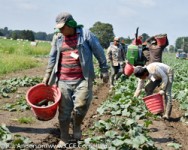Event Details
Date
January 15, 2018
Time
8:30 AM registration, 9:00 AM - 4:30 PM
Location
Holiday Inn Syracuse-Liverpool, Exit 37
Syracuse, NY
Host
NYS Vegetable Growers Association
nysvga.org/expo/information/
2018 Becker Forum: Farm Employment Practices - Planning for the Future
January 15, 2018
The 2018 Becker Forum will take place on Monday, January 15, one day prior to the opening of the Empire State Producers Expo. The forum will focus on agricultural workforce issues with three general themes: securing a legal agricultural workforce, labor law compliance and H-2A program topics.
Featured speaker Kristi Boswell from USDA will provide an overview regarding her agency's activities aimed at improving opportunities for agricultural employers to attract and hire a qualified and legal workforce.
Other speakers will provide a review of changes in both state and federal laws as well as key employment practices to ensure labor law compliance. Belen Ledezma, New York State Monitor Advocate (NYDOL) will review key labor regulations and provide necessary posters for the farm workplace. In addition, Ann Margaret Pointer, attorney with Fisher Phillips, will review key components of federal labor laws that apply to farm employers with a focus on federal DOL inspections and housing.
The afternoon program will focus on information related to the H-2A Program. Current changes in the H-2A program will be highlighted. Since each year H-2A participation in New York increases, a panel of growers with experience using H-2A will guide forum participants through procedures that they used to effectively hire foreign-born H-2A workers.
A roundtable discussion with the speakers at the end of the afternoon will provide an opportunity for questions and discussion regarding critical workforce issues.
Registration for the Becker Forum will be available on the NYS Vegetable Growers Association website accompanying the Empire State Producers Expo information.



































